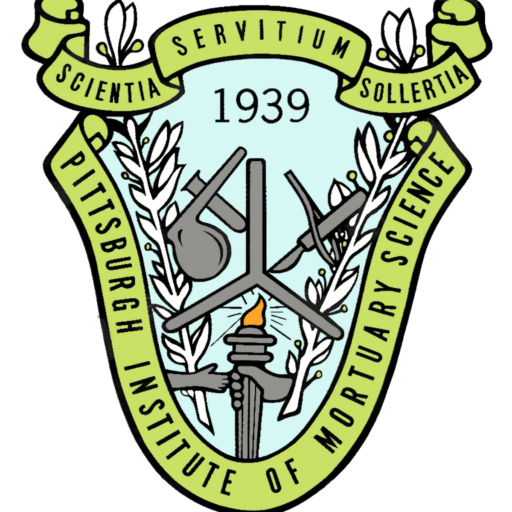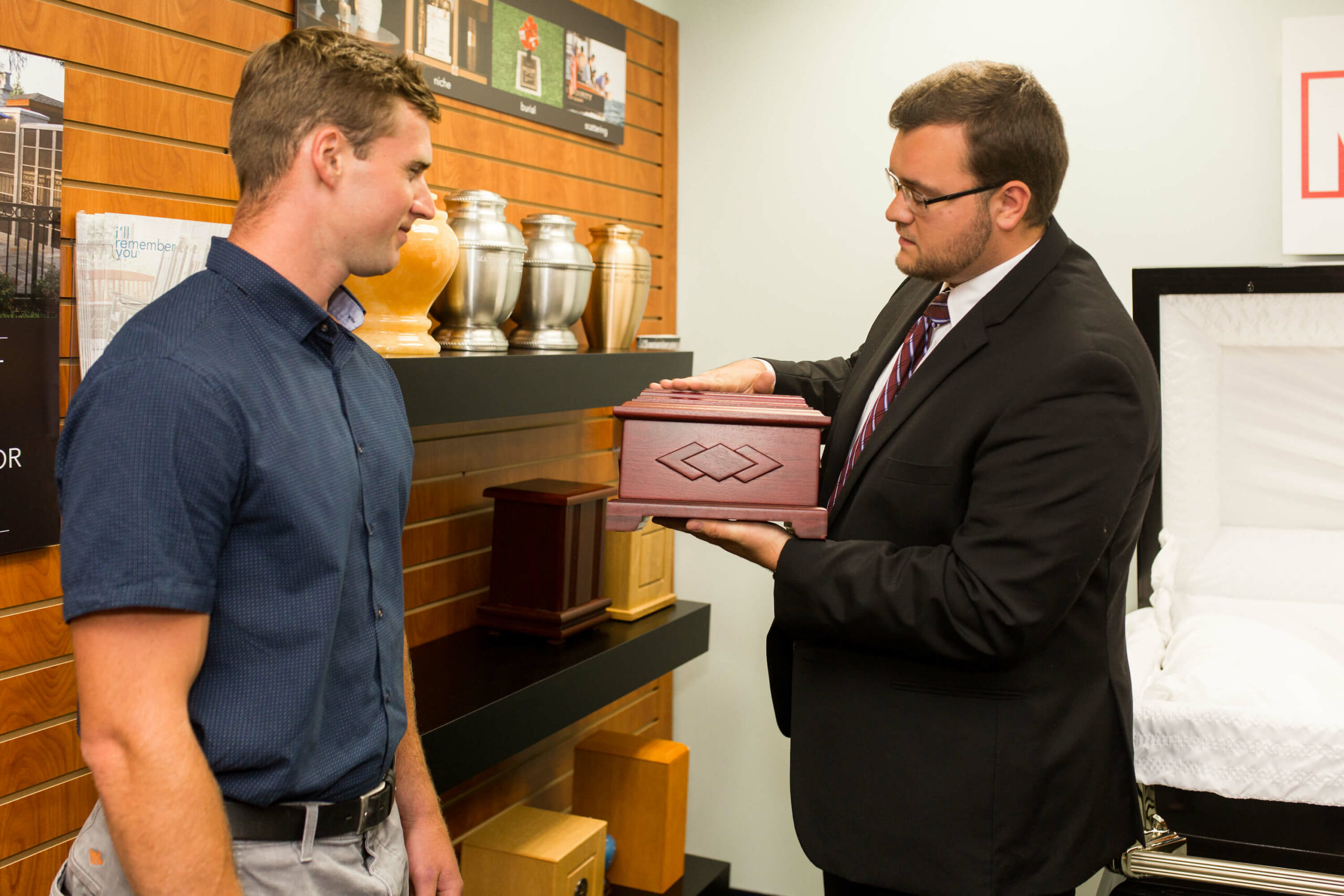THE FUNERAL PRACTICUM EXPERIENCE
You become a part of our family.
At PIMS, like all American Board of Funeral Service Education accredited schools, students fulfill a Funeral Service Practicum. The goal is to give the students “real-world” experience while learning the challenges facing the modern funeral director.
All PIMS students, under the direct supervision of a licensed funeral director, will learn about the paperwork a funeral director uses such as price lists, embalming and cremation authorizations. Also, whether in simulations or real life, students will gain experience with taking first calls, transferring the deceased from their place of death, assisting with funeral arrangements, and even participating in funerals.
AVAILABLE FOR EVERYONE
For campus students, this practical education opportunity is completed at a nearby, approved funeral home.
Online students may perform their practicum at an approved funeral home in their area—it may be the same location where they completed their embalming clinicals.
AVAILABLE FOR EVERYONE
For campus students, this practical education opportunity is completed at a nearby, approved funeral home.
Online students may perform their practicum at an approved funeral home in their area—it may be the same location where they completed their embalming clinicals.
HAVE QUESTIONS?
WHAT IS THE PRACTICUM?
In accordance with the American Board of Funeral Service Education (ABFSE) Standard 5.4.8, all students beginning their education at the Pittsburgh Institute are required to participate in a funeral directing skills practicum. This experiential learning component puts forth a series of funeral service tasks in which the stated goal is to provide an opportunity for all PIMS students to gain practical experiences. Subsequently, students will be asked to engage several strategic tasks in the actual context of the funeral service profession.
What’s The Learning Experience Like?
This unique opportunity is a blended learning experience that may involve: a) tasks simulated at the Pittsburgh Institute and performed under the direct supervision of PIMS instructors, and/or b) tasks in which students will participate by observation directly at the establishments of funeral service providers (under the supervision of licensed directors acting as responsible presenters at such participating firms). Other points to note:
- The practicum will include 31 Contact Hours of experiential learning in context,
- Grading will be based on the student meeting a series of objectives set forth in this agreement and the student must keep a record of his/her progress,
- A grading progress report is completed by the firm that sponsors the student for the practicum and awarded by a licensed funeral director acting as Responsible Presenter/Mentor in the field for the student,
- Grading is PASS, FAIL, OR INCOMPLETE scale, yet mentors in the field are strongly encouraged to offer qualitative feedback in the student report card submitted to the Institute,
- The Practicum is NOT the same as the Clinical Embalming experiential learning component however, the Practicum may be performed at the same location in the case of Distance Learning Students (campus students perform their clinical embalming on campus).
WHY IS THE PRACTICUM NEEDED?
The practicum is a requirement of all students enrolled at ABFSE accredited mortuary schools. The goal of this practicum is to allow students to become familiar with funeral service as practiced in a “real world” professional setting while developing an appreciation for the comportment, work schedule, and challenges facing the modern funeral director. As such, by participating in this practicum, a student will gain valuable insights on his/her level of preparedness, competence, and demeanor to work in funeral service. It should also be noted that other outcomes of this experience include: prospecting for opportunities, best practices for interviewing, and taking responsibility for their own choices.
WHO IS INVOLVED IN THE PRACTICUM?
The Funeral Service Skills Agreement is a contractual agreement involving:
- The student, PIMS, and a funeral home (e.g. the owner of the business, supervisor, or his/her designee),
- A mentor or responsible presenter (which in some cases may be the owner in funeral homes serving a smaller number of families per annum)
WHAT IS INVOLVED?
As per the curriculum requirements listed in the ABFSE Standard 5.4.8 a student, under direct supervision by a licensed funeral director (either a PIMS instructor or a responsible presenter at a service providing funeral home), must participate–which is generally to be interpreted as participation by observation–the prescribed tasks. ABFSE Standard 6.10.1 enumerates the following tasks as requirements for the practicum:
- Utilize the professional forms including but not limited to: First call sheet, Arrangement worksheet, General Price List, Casket Price List, Outer Burial Price List, Embalming Authorization form, and Cremation Authorization Form.
Note: Some portions of this task may either be facilitated at the Institute or “off-campus” at a participating service provider under the guidance of a responsible presenter.
- Demonstrate participation by observation in FIVE first calls or notifications of death by family members; this task can be performed in a simulated setting.
Note: Some portions of this task may either be facilitated at the Institute or “off-campus” at a participating service provider under the guidance of a responsible presenter.
- Perform or assist with a transfer of remains/removal of a decedent from a place of death; consistent with the ABFSE standard this task can be performed in a simulated setting, however, no more than 5 students may receive credit during an individual simulation.
- CAMPUS STUDENTS: It is the policy of the Institute, that campus-based students will perform this removal task to meet the obligations of this agreement, on campus under the supervision of PIMS instructors. In short, this is consistent with the campus policy that NO clinical embalming may be done for credit at offsite facilities and the transfer process is within the scope of meeting decedent care requirements.
- DE STUDENTS: Due to the self-initiated nature of distance learning in which such students MUST secure an ‘off-site” facility for clinical embalming requirements the transfer may be done at the student’s approved facility for both practicum and embalming programs. In short, it is likely DE students are already involved in this process as the nature of a transfer is consistent with a decedent care task. However, if a distance learning student does not have an off-site facility for embalming, he/she MUST agree to attend a transfer seminar conducted at the Institute with the campus students.
- Observe or assist in five arrangement conferences; this task can be performed in a simulated setting, however, no more than 5 students may receive credit during an individual simulation.
Note: It is the policy of the Institute, that campus students will simulate an arrangement conference and prepare all requisite forms listed in the ABFSE Standard 6.10 at least one time in a simulation setting on campus. Students may perform the arrangement conference simulation on more than one occasion under the supervision of a PIMS instructor, however, students are encouraged to participate by observation in this task at an approved service provider under the direction of their responsible presenter. For distance learning students, this requirement is easier to obtain at their approved off-site location
- Observe five funeral-related services in which three of the five services must be from the following list: Liturgical, Non-liturgical, Secular, Chapel, Graveside, Military, Fraternal, Memorial (without the deceased), Direct Cremation, or Other (must be described).
- ABFSE Standard 6.10.7 directly states: “To receive credit, the Student will be required to provide documentation of the service (via service folder, obituary, prayer card, or other artifacts), his/her level of participation in the activity and designate the participants involved (clergy, celebrant, FD, family, or others).”
Note: In accordance with ABFSE Standard 6.10.7, this participation by observation task must be facilitated “off-campus” at a service provider under the direction of a responsible presenter.
- While other “soft skills” training may be a part of the student’s experience in context, proof of performance for the tasks listed above are a requirement for a student to make satisfactory progress in this practicum.
NOTE TO PIMS ONLINE/DISTANCE LEARNING STUDENTS: The tasks required to be performed in the funeral directing skills practicum are separate from the preparation/decedent care tasks that must be fulfilled during the PIMS clinical embalming program. However, both practicums may be performed at the same establishment approved by the PIMS administration. No student shall begin training in the clinical embalming or funeral service practicum until a visit by an authorized PIMS representative has been performed.
HOW MAY THE DESIGNATED TASKS FOR THE PRACTICUM BE PERFORMED?
The tasks may be performed either: a) as a simulation at the Institute under the direct supervision of PIMS faculty/staff; or b) in “real time” at an approved establishment.
It should be noted that sponsoring funeral homes, in accordance with the contractual practicum agreement, shall offer no training in any aspect of the technical applications including (but not limited to): embalming, dressing, reposing, casketing, or other duties involving decedent care assistance. Under the precepts of the funeral directing skills practicum, providers have no obligation to introduce their student trainees to the preparation facilities or any preparation/decedent care work performed at their respective establishments. However, as noted, the PIMS Distance Learning Students are obligated to perform an “off-site” Clinical Embalming program with a separate set of designated tasks required for graduation (please see the link on Clinical Embalming Experience for more details).
WHEN MAY THE DESIGNATED TASKS FOR THE PRACTICUM BEGIN?
The training for the Funeral Service Skills Practicum Experiences typically will start at the beginning of the second trimester for students enrolled in the campus-based program or no later than the fifth term for students enrolled in the distance education program and continue until all tasks have been performed. Once again, completion of all designated tasks and the submission of all required forms is a requirement for graduation from the Pittsburgh Institute.
WHAT IS THE COST OF THE PRACTICUM?
Fees related to the funeral service skills learning experience will include the cost of a one-credit hour course at PIMS in effect at the time the student enrolls in the practicum. Travel fees may be assessed to perform the visit, however, for campus students, site visits are limited to a two-hour driving radius from the Institute. Conversely, for online students, the practicum visit is typically done at the same time of the clinical embalming visit, however, it should be noted that if other related travel fees are needed to conduct the visitation/site approval for the practicum, such fees may be assessed.
It should be noted that the completion of the practicum requirements and submission of all necessary reports, a majority of the fees paid for this experience will be sent to the sponsoring funeral home/responsible presenter (e.g. the current stipend is $250.00 but is subject to change without notice).
Disclaimer About “Performance”
Terms such as “performance, perform, or do” are used throughout this document about the completion of tasks. These terms, when used in the context of this practicum with regard to tasks facilitated at the site of the service provider and/or under the auspices of the responsible presenter, specifically relate to participation by observation. “Performance” is not intended to be literal in this sense; it does not mean that a student must do all the detailed nuances for a given task. Rather, the student is awarded credit by observing such a task under the guidance of his/her responsible presenter. Simulations at the Pittsburgh Institute under the direct supervision of PIMS instructors may require actual engagement of the task.

